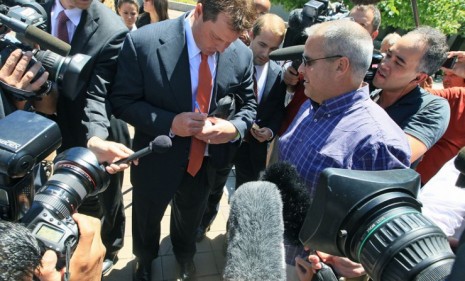The Roger Clemens mistrial: What happened?
One of baseball's greatest pitchers was accused of lying to Congress about performance-enhancing drugs, but prosecutors botched the trial after just two days

A free daily email with the biggest news stories of the day – and the best features from TheWeek.com
You are now subscribed
Your newsletter sign-up was successful
The judge presiding over Roger Clemens' perjury trial declared a mistrial Thursday. The former baseball star was accused of lying during 2008 testimony before Congress, when he said he had never used performance-enhancing drugs during his 24-season Major League Baseball career, despite evidence suggesting that he had. But after the prosecution presented the Clemens jury with what had been deemed inadmissible evidence, Judge Reggie Walton abruptly declared a mistrial. Now, what was expected to be a "long, arduous" criminal trial is, on the second day of proceedings, over. What exactly happened, and what does it mean for the fight against steroids in professional sports? Here, a brief guide:
What was the inadmissible evidence?
One of the "chief pieces of evidence" against Clemens is the testimony of former teammate Andy Pettite, who says that Clemens confessed to him that he had used performance-enhancing drugs. Clemens argues that Pettite misheard him, but Pettite claims that he told his wife, Laura, about their conversation on the same day it happened. Before the trial began, Judge Walton ruled that prosecutors couldn't call Laura as a witness since she hadn't actually spoken to Clemens herself, and would "essentially repeat things Pettite told her" in order to make him sound "more credible," says Dan MacLaughlin at Grantland. The tape that the prosecution played before the jury referred to Pettite's conversation with his wife — precisely the conversation Judge Walton ruled would not be allowed as evidence.
The Week
Escape your echo chamber. Get the facts behind the news, plus analysis from multiple perspectives.

Sign up for The Week's Free Newsletters
From our morning news briefing to a weekly Good News Newsletter, get the best of The Week delivered directly to your inbox.
From our morning news briefing to a weekly Good News Newsletter, get the best of The Week delivered directly to your inbox.
Why couldn't the prosecution show the tape?
The statement from Pettite's wife was hearsay, and therefore not a credible corroboration of Pettite's statement. Playing the tape not only blatantly ignored the judge's orders, but Laura Pettite was never put on a witness stand and cross-examined. Judge Walton declared a mistrial, saying "he could never know what impact the evidence would have during the jury deliberations," according to the Associated Press. "I don't see how I un-ring the bell."
Whose fault is this?
"I think that a first-year law student would know that you can't bolster the credibility of one witness with clearly inadmissible evidence," Walton said to the prosecutor. Indeed, in this whole debacle, says David Steele at Aol, it appears "the only guilty party" is the prosecuting team. "They stand accused of felony sloppiness, inattention and laziness, with charges of gross arrogance available to be filed later."
A free daily email with the biggest news stories of the day – and the best features from TheWeek.com
What happens to the case now?
After a mistrial, there's typically a hearing over whether the case can be retried. The hearing for the Clemens case is scheduled for Sept. 2, and prosecutors have until July 29 to file the motion for the hearing. The question that will dominate the hearing — and determine if another trial is granted — will be whether "any real advantage was gained by the prosecutors" by admitting the evidence that caused the mistrial, says McLaughlin.
And what about Clemens?
"Whether or not the government decides to re-try the case," says Chip Bailey at Ultimate Astros, Clemens' "reputation and legacy have been permanently stained." Clemens wasn't on trial for whether he used steroids, he was on trial for whether he lied about using steroids. But now, thanks to this giant legal blunder, "it's the court of public opinion" that will have to render the "striking verdicts" on both accounts, says Mark Kreidler at ESPN.
Is this the end of the government's probe into steroid use?
This is a huge blow to a case that was supposed to bring "closure to the government's decade-long fight against doping in professional sports," says Patrik Jonsson at The Christian Science Monitor. Millions of dollars have been pumped into these investigations, including unsuccessful perjury cases against Barry Bonds and Clemens, and the public is fed up. The government's failure "is tantamount to some giant swings and misses," says Kreidler. In other words, regardless of the future of the Clemens case, "the overarching reality is that the courts won't ultimately be of much help here."
Sources: Aol, Associated Press, Christian Science Monitor, ESPN, Grantland, Ultimate Astros
-
 Political cartoons for February 20
Political cartoons for February 20Cartoons Friday’s political cartoons include just the ice, winter games, and more
-
 Sepsis ‘breakthrough’: the world’s first targeted treatment?
Sepsis ‘breakthrough’: the world’s first targeted treatment?The Explainer New drug could reverse effects of sepsis, rather than trying to treat infection with antibiotics
-
 James Van Der Beek obituary: fresh-faced Dawson’s Creek star
James Van Der Beek obituary: fresh-faced Dawson’s Creek starIn The Spotlight Van Der Beek fronted one of the most successful teen dramas of the 90s – but his Dawson fame proved a double-edged sword